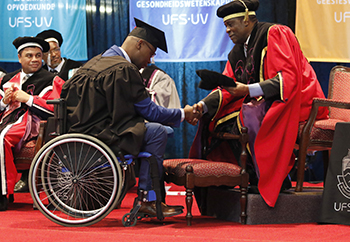Latest News Archive
Please select Category, Year, and then Month to display items
25 March 2024
|
Story Anthony Mthembu
|
Photo Lutendo Mabata
 Prof Nompumelelo Zondi, the newly appointed Vice-Dean: Research and Postgraduate Studies in the Faculty of The Humanities at the University of the Free State (UFS).
Prof Nompumelelo Zondi, the newly appointed Vice-Dean: Research and Postgraduate Studies in the Faculty of The Humanities at the University of the Free State (UFS).
Prof Nompumelelo Zondi has been appointed as Vice-Dean: Research and Postgraduate Studies in the Faculty of The Humanities at the University of the Free State (UFS). Prof Zondi assumed this new role on 1 March 2024 after serving as the Head of Department for African Languages at the University of Pretoria for seven years. “I consider this appointment as an opportunity of growth and learning more about higher education and the Faculty of The Humanities at large,” she said.
Prof Zondi indicates that part of her role is to spearhead the UFS Vision130 within the Faculty of The Humanities, and to ensure that the faculty assists the institution in becoming research-led, student-centred, and globally impactful.
Motivation for assuming this role
One of the primary reasons that led her to consider this role is sharing the knowledge she acquired as part of the Fulbright South African Research Scholar Programme. As a result of that experience and exposure, which went beyond the Ohio State University, she felt it befitting to implement some of the insights she acquired on a bigger scale. Therefore, even though she was impactful in her previous role, Prof Zondi believes that this is an exceptional and more desirable platform to do so. “I feel that I will have easier access to departments within the faculty, while also encouraging and supporting interdepartmental and faculty collaborations,” she explained.
A significant component of Vision 130
He believes that the elements that make up Vision 130 are interrelated. While she considers research central to Vision 130 – as she begins her journey at the UFS, she feels students deserve to be nurtured to further contribute to the university’s impactful research. Thus, student-centredness is the way to go. “I believe that students must be major role players in this Vision130; we must include them in the interactions and discussions that are part of the university’s strategic plan as well as in decision-making processes,” she said. As such, according to Prof Zondi, the more the faculty and the institution care for the students and involve them in Vision130 and in collaborations, the more research outputs the university will achieve.
Largest number of CUADS graduates at UFS
2017-07-03

During the mid-year graduation ceremonies at the
University of the Free State (UFS), the Centre for
Universal Access and Disability Support (CUADS) saw
the largest number of students with disabilities graduating.
Photo: Johan Roux
During the mid-year graduation ceremonies at the University of the Free State (UFS), the Centre for Universal Access and Disability Support (CUADS) saw the largest number of students with disabilities graduating.
For the first time since being established in February 2001, a total number of 30 students graduated, of which seven were postgraduate students.
Accomplishing your dreams as a student
Martie Miranda, Head of CUADS, says that one cannot help but become emotional with joy and happiness. “The feeling of satisfaction we feel with the graduates is so valuable, because it’s a reminder of their abilities to accomplish their dreams just like any other student.”
CUADS aims to ensure that the UFS creates opportunities for students with disabilities, aiming to become a higher-education institution recognised for its efforts in human reconciliation. Together with the Exam Division, CUADS coordinates alternative assessment with an accessible test and examination facility housed at CUADS. This accommodates students with concessions, amanuensis, specialised equipment, and accessible formatted papers.
Changing the challenges you experience
Miranda continuously encourages students to keep going. “If being successful is important to you, you will find a way to change the challenges you experience into opportunities. Either to learn something about yourself or teach someone else something.”
Below are the number of graduates from each faculty:
• Faculty of Law: 2
• Faculty of Economics and Management Sciences: 4
• Faculty of Education: 4
• Faculty of Natural and Agricultural Science: 9
• Faculty of the Humanities: 11